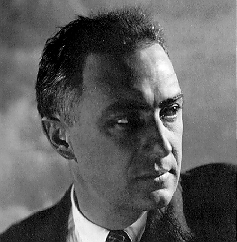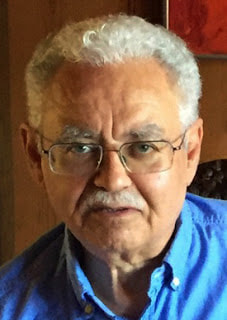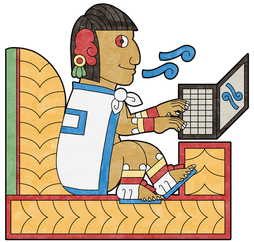On occasion of the poet's birthdate  William Carlos Williams in his 50s William Carlos Williams in his 50s William Carlos Williams was born on September 17, 1883, in Rutherford, New Jersey. The date was auspicious because it falls today during a period of celebrating the liberation of several Spanish speaking countries from foreign rule. His struggle with identity that resulted in a remarkable contribution to the world of literature may be a metaphor for that impulse toward freedom. Recent community upheavals in the United States support the argument that people whose contributions to a nation’s development have been slighted or distorted by the ruling majority will seek to correct history. Over recent decades, growing Chicano and Latino political awareness has opened wider the gates to academia for more Latinos and led to scholarly research into the Hispanic past of the United States. We have discovered that the origins of many famous people are rooted in Mexican, Caribbean and Latin American heritage, as well as from Spain. William Carlos Williams, one of the most influential poets of the 20th century, is one of those famous Americans whose Hispanic origin has been little known. He came by his middle name by virtue of his mother, Raquel Hélène Rose Hoheb, who was born in Puerto Rico. From the evidence to be found in his autobiography, his poetry, and writings about him, his mother and her maternal origins lent more than a middle name to the poet and his works. Williams’ writings have been thoroughly critiqued and his life minutely detailed by biographers; I don’t intend to advance such scholarship about him but simply to revive the significance of his life’s work to the Latino community. In Williams’ autobiography, he simply introduces his mother, Elena, as she was called in the U.S., by saying she had come to the U.S. via Santo Domingo “to be married.” (W.C.W., p. 5) The road extended back much farther. Elena’s mother, Meline Hurrard (or Jurrard) was of Basque ancestry whose family had emigrated from Bordeaux to Martinique, a French possession in the Caribbean in the early 1800s. She had married Solomon Hoheb, whose ancestors had been Sephardic Jews in Holland. (P.M., p. 15) Unfortunately, Williams relates matter-of-factly, the eruption of Mount Pelée in 1902 wiped out the Hurrard side of Elena’s family along with the other 28,000 inhabitants of the city of Saint-Pierre. Due to this mixed heritage, Elena spoke both Spanish and French, the two languages that were apparently the idioms of Williams’ childhood. “Spanish and French were the languages I heard habitually while I was growing up,” Williams tells us. “Mother could talk very little English when I was born, and Pop spoke Spanish better, in fact, than most Spaniards.” (W.C.W., p. 15) Obviously, Spanish was dominant in Williams’ first years. William George Williams, or “Pop” as Williams called his father (Elena was always “mother”), had remained an English citizen despite residing in the U.S. throughout his adult years. At the age of five, Pop’s family had migrated from England to the Caribbean, living first in St. Thomas and then moving to Santo Domingo. William George thus became an hispanohablante from childhood. He and Elena met in Santo Domingo and later on when the elder Williams had moved to New York City, he brought Elena over to marry. No doubt due to his Spanish fluency, when William George became ad manager for the manufacturer of a cologne called, Florida Water, the job took him to South America on prolonged assignments. When Pop went to Buenos Aires in 1897 to help organize a factory and distribution center there, mother and the boys, William Carlos, 14, and his brother, Ed, 13, sailed from New York City to spend a year in Paris. A multi-talented woman, his mother had studied painting for three years in Paris in the late 1870s, and had also spent a short while in Geneva. The trio lived with an aunt and cousins of their mother’s during their year-long stay. Besides her multilingual skills and painting talents, Elena also played the piano, accompanying the choir on Sundays at the Unitarian Church where Pop served as superintendent of the Sunday school for 18 years. In his autobiography, Williams belittled his own Spanish, but he was apparently fluent enough to write poetry in Spanish and translate as well. A physician for most of his adult life, he recalls that as an intern, he was relegated to escorting an aged but wealthy Mexicano ranch owner and railroad executive, from New York City back to his native San Luis Potosí, primarily to keep him alive till he got him there. Though, as Williams says, “My Spanish wasn’t so hot,” (W.C.W., p. 73) he managed to cope with the situation, and delivered the old man, alive, to his family after a four-day trip. The man died within a day, but by then Williams was headed back home, 10 $20 gold pieces in his pockets as payment from the anciano’s son. William Carlos had obtained an internship at the French Hospital in Manhattan at the suggestion of J. Julio Henna, a senior member of the medical staff there, and an old friend of his father’s—Henna was one of three physicians (including Ramón Emeterio Betances) who had fled Puerto Rico in the early 1880s because of their rebellion against Spanish rule. The name that Williams chose as his pen name, so to speak, is instructive of where his loyalties and sensibilities lay with regard to his bicultural background. In 1909, he self-published a thin volume of poems with “not one thing of the slightest value” in it, he says in his autobiography, (W.C.W., p. 107) but perhaps using some of the Mexican gold dollars for the venture. When it came time for him to decide on what his literary signature would be, he decided on William Carlos Williams: “To me the full name seemed most revealing and therefore better.” (ibid, p. 108) What he meant by most revealing and better, he does not disclose. Williams’ third book of poems, published in 1917, was titled Al Que Quiere, and included a poem entirely in Spanish. Paul Mariani, one of his biographers, reports that Pop Williams was “furious” that the publisher had gone to press with three typos in that one piece. (P.M., p. 13) The Williamses kept close ties with Puerto Rican kin. One Fourth of July, when Williams was about 9 or 10, he was playing with his cousins Carlito and Raquel, who were on an extended visit, when a toy cannon they had filled with gun powder discharged in Williams’ face and nearly blinded him; for weeks, he had bandages on his face, but no permanent harm occurred. (W.C.W., p. 18) The cousins were the offspring of Elena’s brother, Carlos, also a physician. A conflict arose early on between his mother and British grandmother, Emily Dickenson Wellcome, over the rearing of young William. The grandmother tried to take over his upbringing, Williams recalled, until one day, “Mother lost her temper and laid the old gal out with a smack across the puss. … Her Latin blood got the best of her that day. Nor was she sorry; it did her more good, in fact, than anything that had happened to her since her coming to the States from Santo Domingo to be married. I think that one of the most potent forces that kept my mother going to the age of ninety-two was a malign determination to outlive her mother-in-law, who died at eighty-three in 1920. I hope I take after my female ancestors.” (W.C.W., p. 5) Perhaps the most startling influence his mother might have had on Williams was her spiritualism, a tendency that often caused her suddenly to lapse into a trance. Close friends and family knew her as a medium; she often would lose awareness of her surroundings but continue to communicate as if in another persona. On one occasion, Williams relates, just as the family was at supper, Elena began looking around as if lost, and spoke as if she were someone else. His father asked her name and she said, “Why I’m Lou Payne.” (W.C.W., pp. 15-16) Pop Williams wrote to Jess Payne, a former neighbor and friend, who wrote back informing William George that, Lou Payne, the neighbor’s wife, had been near death from an illness just at the time that Elena had gone into the trance. How else explain any number of his poems that convey a perspective as if from within a mirror, from another dimension? Here are a few lines from “Portrait of the Author”: The birches are mad with green points the wood’s edge is burning with their green, burning, seething—No, no, no. The birches are opening their leaves one by one. Their delicate leaves unfold cold and separate, one by one. Slender tassels… CEP, p. 228 In a later poem, “Eve,” he says, as if vindicating his mother’s terrible gift, “I realize why you wish/to communicate with the dead—/And it is again I/who try to hush you/…It not so much frightens/as shames me. I want to protect/you, to spare you the disgrace—/seeing you reach out that way/to self-inflicted emptiness.” (C.E.P., pp. 376-77) The influence of Hispanic roots on Williams has been thoroughly thrashed out by Julio Marzán, a Puerto Rican born poet and English professor now living in Queens, New York. Marzán published The Spanish American Roots of William Carlos Williams in 1994. In seeking to give voice to his Latino persona, Marzán posits, Williams invented a system of expression which enabled him to convey through English “a nascent writing that appears to have no roots in this country’s literature.” In other words, Williams’ poetry represents in fact “a major Latin literary root in Anglo American letters.” (J.M., p xi) But Williams must have felt he had to be circumspect. He did not want to be labeled by critics or fellow poets as less than a real American writer because he was the son of immigrants. He sought to repel or dispel the biased notion that as a “foreigner” he could not write “good” English, and therefore, he had to write better than anyone else and do so within the American idiom. It seems that Williams found his voice by developing an approach to poetry, different from either that of the European classicist variety or the modernists of that era such as Ezra Pound and T.S. Eliot. Thus, his primary contribution to American, even world, literature, was to liberate the poet from the oppression of language, that is, to convey his own worldview through whatever influences or informs his personal identity and free of Old World forms. Dante Alighieri reflected this consciousness when he broke away from the Church-imposed Latin as the lingua franca to write the Divine Comedy in the vernacular of the Italian people; by doing so, he freed the Italian language from bondage and created a new literature. Part of or perhaps the underlying genius in Williams’ poetry, Marzán suggests, is his ability to convey externally the Anglo American persona, which was necessary to avoid being labeled a Latin immigrant and therefore less than an adequate or acceptable writer of English, while imbuing through a kind of code the very cultural essence that was his true self. Had Williams openly professed his Boricua roots, he would probably have been relegated to a second tier as a writer, as the offspring of immigrants trying to pass himself off as a White Anglo American. In short, he might never have continued as a writer. Was this code, as Marzán calls it, actually a means that Williams used to suppress his “Spanish American roots,” a rejection of his Latino origins? Not likely. That would have meant abandoning his mother, both figuratively and physically. It’s quite clear from his writings that he cherished his mother, despite her idiosyncrasies. Williams visited Mayagüez in 1956, apparently on a mission to learn more about his roots; among other things, he found out the year of his mother’s birth— for some reason, she had kept the fact hidden from her children until her death. Any writer will tend to convey in his language the ethos that is derived from his origins. That doesn’t make it good literature. Most of the writing in the early years of the Chicano movement would not pass muster today as first class fiction or poetry; it was heavily nationalistic but its good intent would not redeem it as credible literature. Learning about Williams’ experience as a bilingual and bicultural person adds another dimension to his overall contribution to literature. Williams mastered what was essentially a second language, English, and obviously wrote beyond the ordinary—he established a standard. Chicanos writers, I for one, tend to write with a pronounced ethnic slant. That does not relieve me of the obligation to write as well as I can in English and when I do so in Spanish, my mother tongue. During Williams’ era, the buzzwords stereotyping or racial profiling with their present connotation did not exist, but the denigration of foreigners and immigrants did: Williams realized this and, if Marzán is correct, adjusted to the reality through subterfuge or subtlety, and even “coding” in his poetry. But, much has changed since Williams’ day. We can criticize writing if it’s just poorly worded or structured, but to demean a poem or story, let alone a community, because it derives from a “foreign” source, or communicates through an “inferior” language, can cause immediate push-back from various social sectors. Unlike Williams, I feel very comfortable if some of my writing clearly defines me as a Chicano writer or poet, because I can also write from the universal center that Williams found, which is unrelated, even unconscious, of an ethnicity, a place of birth, or a spiritual slant. That underlying impulse in Williams’ poetry of a Latino sub-consciousness empowers all Latino writers. Having set the benchmark in the English idiom, he has “proven” as it were that one can be Latino, Chicano, Boricua or whatever, and still exercise a mastery of English. In fact, Williams tells us, we can enhance the English language because of our bicultural and bilingual nature. This is precisely what Williams was suggesting in 1940, when he spoke at the First Inter-American Writers’ Conference at the University of Puerto Rico. According to Mariani, Williams “studded his talk with references to Spanish literature and to the salutary influence that literature had had on the American language,” (P.M., p. 446) going so far as to compare the Spanish dramatist, Lope de Vega, to Shakespeare. Mariani says it was “a way of paying tribute to his parents… For the first time in his life, Williams had returned to his mother’s ancestral home.” (P.M., p. 446) Of course, Mariani missed the whole point. Williams had long before “returned to his mother’s” cultural roots, if he had ever left them, through language—here was an American writer, who could tell the difference between the shorter line of four stresses in Spanish drama and poetry against the iambic pentameter of Shakespeare’s works, and dare to urge North American writers to take advantage of the Spanish idiom. Mariani quotes from Williams’ speech: “In many ways, sixteenth and seventeenth century Spain and Spaniards are nearer to us in the United States today than perhaps, England ever was. It is a point worth at least taking into consideration. We in the United States are climactically as by latitude and weather much nearer Spain than England, as also in volatility of our spirits, in racial mixture—much more like Gothic and Moorish Spain.” P.M., p. 446-47. This doesn’t sound like someone who rejects his bicultural roots. Rather it reveals in the “we” that he recognized his origins and found them more vital and organic to his writing than even English literature. Is it not a tribute to his mother and a profession of his Hispanic roots that he claims that “volatility of spirits” and “racial mixture” as his own? As subtle as ever, Marzán would say. Williams again seems to be using code words for the influence of his mother, the volatile medium, and his own mixed racial and ethnic ancestry. Today, it’s very likely that Williams would have felt quite comfortable to break the code and call himself a Boricua or Latino poet. William Carlos Williams died March 4, 1963, age 80, after suffering a series of strokes that left him unable to write. Up until now, few if any Latinos have appreciated him as a brother. It must be a final culmination of his complex life that we can now fully proclaim and esteem William Carlos Williams as a Latino poet, no half ways about it. Sources: The Autobiography of William Carlos Williams, (W.C.W.) by William Carlos Williams, New Directions Books, Norfolk, Conn., 1948. The Collected Earlier Poems, (C.E.P.) by William Carlos Williams, New Directions Books, Norfolk, Conn., 1938, 1951. The Collected Later Poems, (C.L.P.) by William Carlos Williams, New Directions Books, Norfolk, Conn., 1944, , 1948, and 1950. The Spanish American Roots of William Carlos Williams (J.M.), by Julio Marzán, University of Texas Press, Austin, 1994. William Carlos Williams, A New World Naked, (P.M.) by Paul Mariani, McGraw-Hill, New York, 1981.  Armando Rendón is author of Chicano Manifesto, a long-time writer on Chicano and Latino affairs, and in his later years, having been inspired by the likes of Williams, turning more to poetry. He is in the midst of reading all of Williams’ poems.
0 Comments
Your comment will be posted after it is approved.
Leave a Reply. |
Archives
June 2024
Categories
All
|
Donate and Make Literature Happen
is published by the Somos En Escrito Literary Foundation,
a 501 (c) (3) non-profit, tax-exempt corporation. EIN 81-3162209


 RSS Feed
RSS Feed